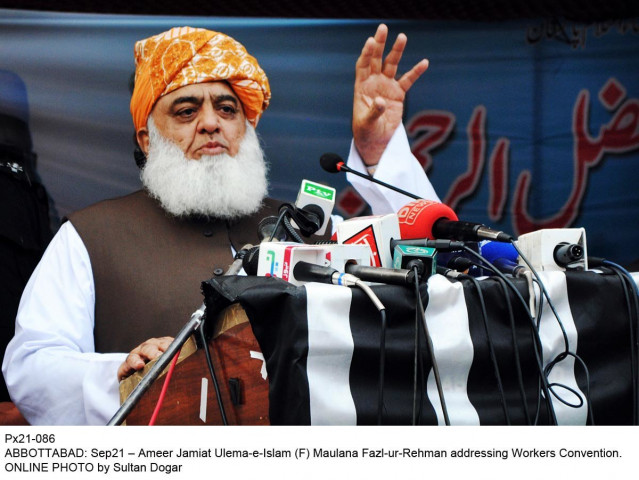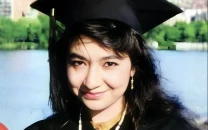IHC throws JUI-F rally in Islamabad officials’ court
Court instructs federal capital’s administration to decide permission to ‘Azadi march’

JUI-F chief Maulana Fazlur Rehman. PHOTO: ONLINE/FILE
Earlier this month, JUI-F leader Maulana Abdul Ghafoor Haideri, through his counsel Kamran Murtaza, had submitted an application to the Islamabad chief commissioner seeking permission to stage its long march at D-Chowk on October 27 -- later the date was changed to October 31.
IHC Chief Justice Athar Minallah, after hearing a petition against the march filed by a lawyer Razi Hanif Rahi, noted that “a peaceful protest staged by unarmed persons is a constitutionally protected right”.
“This right stems from the fundamental rights of freedom of assembly, freedom of association and freedom of speech/expression, which are guaranteed the Articles 16, 17 and 19 of the constitution respectively,” the court verdict read.
“No law-abiding citizen can, therefore, be denied the right of protest.”
However, the court also observed that the “state only in extraordinary and exceptional circumstances can retrain a person from exercising their right to protest on the grounds of national security”.
“Peaceful protesters cannot be allowed to infringe the fundamental rights of other citizens. It is thus the duty of public functionaries to ensure that the constitutionally guaranteed rights of every citizen are protected. Maintaining public order is a crucial responsibility of the state and its functionaries,” the IHC noted.
“The right to protest is indeed not an absolute right but it is subject to reasonable conditions. It is the responsibility of the law enforcing authorities to consider several factors while imposing restrictions o conditions for the purposes of regulating a peaceful protest so that the rights of other citizens also remain protected.”
The court observed that for this purpose, the law enforcement agencies could impose restrictions regarding the route or venue of the protest.
It also noted that as the Islamabad administration and law enforcement agencies had not passed any order in connection with the JUI-F rally yet, the petitions against it were based on mere apprehensions.
Justice Minallah recalled that the high court had also allowed Pakistan Tehreek-e-Insaf (PTI) to stage a sit-in in 2014 with the same directives to the local administration to protect the rights of citizens.
During the hearing, the IHC chief justice was irked by the petitioner’s arguments. “Are you representing the government?” he asked. “Because your arguments suggest you are speaking on their behalf.”
The petitioner had contended that the purpose for which the protest was being organised manifested “mala fide” intent and also apprehended that it would disrupt the daily activities of the citizens of Islamabad.





1724912122-0/Untitled-design-(1)1724912122-0-208x130.webp)













COMMENTS
Comments are moderated and generally will be posted if they are on-topic and not abusive.
For more information, please see our Comments FAQ